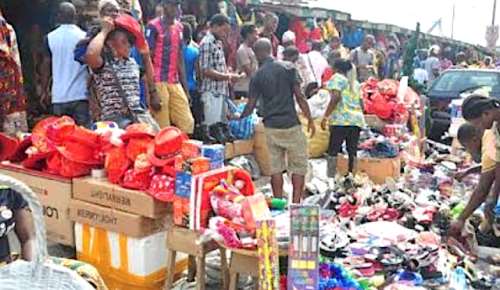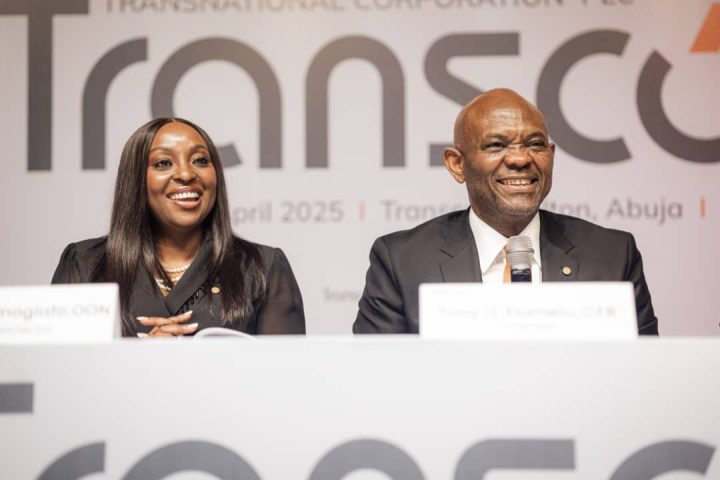Christmas in Nigeria is synonymous with celebration, food, and family. However, before December 25th approached, many Nigerians had complained about economic hardship, soaring inflation, and stagnant wages and how it was going to affect the celebration with their family.
Yet, visits to popular markets such as Oshodi, Isolo, and Ikotun, in Lagos before and on Christmas day, revealed bustling crowds. Shoppers filled the markets, purchasing food, clothes, and other essentials despite skyrocketing prices.
Join our WhatsApp ChannelVisits to these markets reveal a mixed reality: while some struggle with escalating prices, others find ways to adjust and keep the holiday spirit alive.
Food Prices Soar, Yet Demand Remains High
At Isolo Market, traders noted significant price hikes for essential foodstuffs. A trader, Mrs. Bola, lamented the situation, saying, “The price of rice has gone up again. A bag that sold for N38,000 last month is now N107,000. Yet, people still buy because Christmas must be celebrated.”
Similarly, the cost of proteins like turkey and chicken has skyrocketed. A carton of turkey, previously sold for N44,000, now goes for N57,000, while a carton of chicken is priced at N84,000. Shoppers expressed their frustration but acknowledged the necessity. “What can we do? Our children are looking forward to a good meal,” said Mr. Adekunle, who was seen haggling for a sack of croaker fish priced at N120,000.
Clothing Stalls See High Patronage
Clothing vendors at Oshodi Market reported brisk sales despite the economic strain. Many parents prioritised purchasing new outfits for their children. “It’s tradition to wear something new for Christmas,” explained Mrs. Esther, a shopper. “Even if it means cutting down on other things, we can’t let the kids miss out. I had to wait till this morning because of lack of funds from the beginning of the months. At least they can use the clothes for both Christmas and New Year”
A trader at the market, Mr. Chike, confirmed the trend. “People are buying, but they are more selective now. They negotiate more and sometimes settle for cheaper items.”
Shoppers’ Coping Strategies
At Ikotun Market, shoppers and vendors alike shared how they were navigating the rising costs. Chika, a customer, shared her strategy: “I came with a budget. Once I exhaust it, that’s it. I’ve already prioritised what’s important—food and drinks first.”
READ ALSO: What To Do If Your Uber Driver Charges ₦38k And Above This Christmas, New Year
POS operators in these markets have also devised creative ways to manage their expenses. Chioma Emeka, a POS operator at Oshodi Market, explained her workaround to avoid the N50 electronic transfer levy. “I process N9,999 instead of N10,000 to dodge the charge. It’s not much, but every naira counts these days, I now charge N200 for N5,000 and N300 for N10,000 and above” she said.
Transport Costs Add to Financial Strain
Transport fares have also surged, making market trips more expensive. At Oshodi, a commercial driver, Mr. Musa, justified the hike: “Fuel prices are high, and we have to meet our targets. From Oshodi to Ketu, it’s now N800, up from N700. People may complain, but they still pay.”
Shoppers, however, were not as understanding. Mary, a commuter, vented her frustration: “It’s unfair. By the time you factor in transport, it eats into your shopping budget.”
Balancing Tradition and Financial Reality
Despite these challenges, Nigerians remain committed to celebrating Christmas. The resilience of market shoppers and traders showcases a determination to uphold traditions, even in tough times.
For some, the festivities are about maintaining a sense of normalcy. “We work all year, so this is our time to enjoy and relax with family,” said Mr. Olatunji, a shopper at Isolo Market.
For others, it’s about preserving cultural and familial bonds. As Mrs. Funmi at Oshodi Market put it, “Christmas is not just a day; it’s a feeling. No matter the hardship, we can’t let go of what makes us happy.”
Rising Prices Spark Controversy
The festive rush has also reignited debates about the government’s role in controlling inflation. Vendors and consumers alike criticised the lack of intervention in curbing food and transport prices.
A vendor at Ikotun Market, Mr. Emeka, summed up the sentiments: “The government needs to do more. This isn’t sustainable. We’re just managing for now because it’s Christmas.”
The Christmas rush in Lagos markets highlights the resilience and adaptability of Nigerians amid economic challenges. While rising costs dampen the mood for some, the spirit of the season persists. As families gather to celebrate, they do so with a mix of joy and determination, proving that the holiday spirit remains unbroken.
Emmanuel Ochayi is a journalist. He is a graduate of the University of Lagos, School of first choice and the nations pride. Emmanuel is keen on exploring writing angles in different areas, including Business, climate change, politics, Education, and others.
- Emmanuel Ochayihttps://www.primebusiness.africa/author/ochayi/
- Emmanuel Ochayihttps://www.primebusiness.africa/author/ochayi/
- Emmanuel Ochayihttps://www.primebusiness.africa/author/ochayi/
- Emmanuel Ochayihttps://www.primebusiness.africa/author/ochayi/


















Follow Us